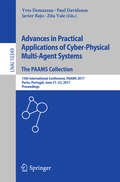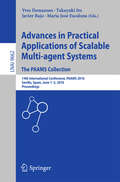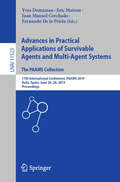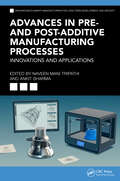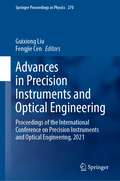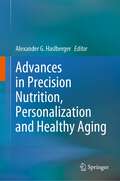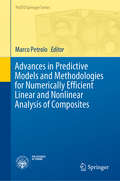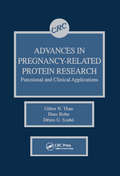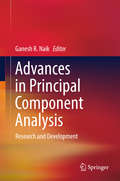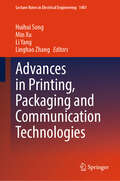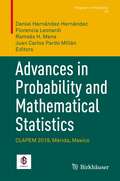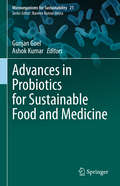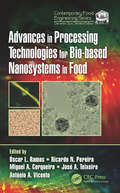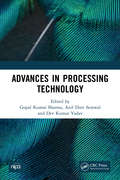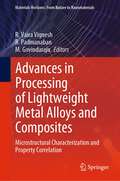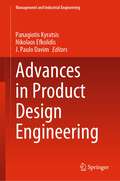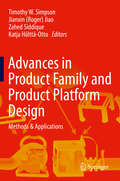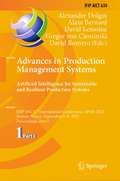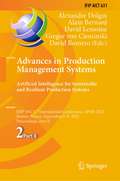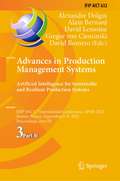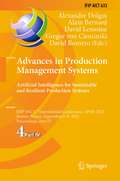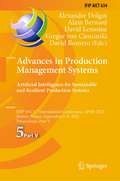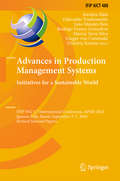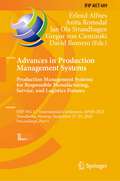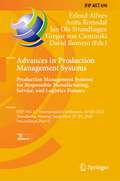- Table View
- List View
Advances in Practical Applications of Cyber-Physical Multi-Agent Systems: The PAAMS Collection: 15th International Conference, PAAMS 2017, Porto, Portugal, (Lecture Notes in Computer Science #10349)
by Javier Bajo Yves Demazeau Zita Vale Paul DavidssonThis book constitutes the refereed proceedings of the 15th International Conference on Practical Applications of Scalable Multi-Agent Systems, PAAMS 2017, held in Porto, Portugal, in June 2017. The 11 revised full papers, 11 short papers, and 17 Demo papers were carefully reviewed and selected from 63 submissions. The papers report on the application and validation of agent-based models, methods, and technologies in a number of key application areas, including day life and real world, energy and networks, human and trust, markets and bids, models and tools, negotiation and conversation, scalability and resources.
Advances in Practical Applications of Scalable Multi-agent Systems. The PAAMS Collection: 14th International Conference, PAAMS 2016, Sevilla, Spain, June 1-3, 2016, Proceedings (Lecture Notes in Computer Science #9662)
by Takayuki Ito Javier Bajo Yves Demazeau Maria José EscalonaThis book constitutes the refereed proceedings of the 14th International Conference on Practical Applications of Scalable Multi-agent Systems, PAAMS 2016, held in Sevilla, Spain, in June 2016. The 9 revised full papers, 10 short papers, and 16 Demo papers were carefully reviewed and selected from 58 submissions (39 full paper and 19 Demo paper submissions. The papers report on the application and validation of agent-based models, methods, and technologies in a number of key application areas, including day life and real world, energy and networks, human and trust, markets and bids, models and tools, negotiation and conversation, scalability and resources.
Advances in Practical Applications of Survivable Agents and Multi-Agent Systems: 17th International Conference, PAAMS 2019, Ávila, Spain, June 26–28, 2019, Proceedings (Lecture Notes in Computer Science #11523)
by Juan Manuel Corchado Yves Demazeau Fernando De la Prieta Eric MatsonThis book constitutes the proceedings of the 17th International Conference on Practical Applications of Agents and Multi-Agent Systems, PAAMS 2019, held in Ávila, Spain, in June 2019. The 19 regular and 14 demo papers presented in this volume were carefully reviewed and selected from 55 submissions. They deal with the application and validation of agent-based models, methods, and technologies in a number of key applications areas, including: Agronomy and Internet of Things, coordination and structure, finance and energy, function and autonomy, humans and societies, reasoning and optimization, traffic and routing.
Advances in Pre- and Post-Additive Manufacturing Processes: Innovations and Applications (Innovations in Smart Manufacturing for Long-Term Development and Growth)
by Naveen Mani Tripathi and Ankit SharmaThis book provides knowledge about the process of creating and designing products based on an Industry 4.0 setting. The fundamentals of Additive Manufacturing, its many technologies, the process parameters, advantages, limitations, and recent developments are discussed. In addition, the most recent post-additive manufacturing process advancements, surface quality defects, and challenges are the primary topics that will be investigated in the book. Advances in Pre- and Post-Additive Manufacturing Processes: Innovations and Applications provides scientific and technological insights into the physical fundamentals of the machining and finishing processes in macro, micro, and nanoscales. It explores in a systematic way both conventional and unconventional material-shaping processes with various modes of hybridization concerning theory modelling and industrial potential. It focuses on the applications of Additive Manufacturing that are linked to pre-stage and post-stage processes and encompasses a broad spectrum of macro, micro, and nano-processes that are utilized in manufacturing activities. The book goes on to cover a wide range of reliable and economical fabrication of metallic parts with complicated geometries which are of considerable interest to the aerospace, medical, automotive, tooling, and consumer products industries. This reference title encapsulates the current trends of today’s material development and machining techniques for advanced composite materials, making it a one-stop resource for academic researchers and industrial firms while they are formulating strategic development strategies. It also serves as a reference book for students at all levels of education, from undergraduates to doctoral candidates.
Advances in Precision Instruments and Optical Engineering: Proceedings of the International Conference on Precision Instruments and Optical Engineering, 2021 (Springer Proceedings in Physics #270)
by Guixiong Liu Fengjie CenThis book highlights the new technologies and applications presented at the 2021 International Conference on Precision Instruments and Optical Engineering held in Chengdu, China from 25 to 27 August 2021. The conference aimed to provide a platform for researchers and professionals to share research findings, discuss cutting-edge technologies, promote collaborations and fuel the industrial transition of new technologies. The invited and contributed papers covered recent developments in optoelectronic devices, nanophotonic research, optoelectronic materials, precision instruments, intelligent instruments, laser technology, optical spectroscopy and other optical engineering topics. The book is intended for researchers, engineers and advanced students interested in precision instruments and optical engineering and their applications in diverse fields.
Advances in Precision Nutrition, Personalization and Healthy Aging
by Alexander G. HaslbergerThis book provides an overview on current trends and developments in precision nutrition and personalized health preservation, focussing on a field which is undergoing rapid change. Today, personalized strategies contrast generally accepted guidelines for specified groups and improved health and disease markers are shifting health care toward preventive strategies. At the same time, advances in food additives, nutraceuticals, functional, and medical foods are breaking down the traditional domains of health-related disciplines. This book aims to provide an overview on these processes, discusses arising problems, and provides an outlook on the future of personalized health care and the role of precision nutrition. It covers preliminary thoughts on what has been achieved and focusses on developments in the area of metabolic diseases, aging, and neurology. The book is intended as a primer in the field of precision nutrition and is aimed at researchers, clinicians, and students in health-related disciplines, who would like to get insights into current trends and developments in this area
Advances in Predictive Models and Methodologies for Numerically Efficient Linear and Nonlinear Analysis of Composites (PoliTO Springer Series)
by Marco PetroloThis book gathers contributions addressing issues related to the analysis of composite structures, whose most relevant common thread is augmented numerical efficiency, which is more accurate for given computational costs than existing methods and methodologies. <P><P>It first presents structural theories to deal with the anisotropy of composites and to embed multifield and nonlinear effects to extend design capabilities and provide methods of augmenting the fidelity of structural theories and lowering computational costs, including the finite element method. <P><P> The second part of the book focuses on damage analysis; the multiscale and multicomponent nature of composites leads to extremely complex failure mechanisms, and predictive tools require physics-based models to reduce the need for fitting and tuning based on costly and lengthy experiments, and to lower computational costs; furthermore the correct monitoring of in-service damage is decisive in the context of damage tolerance. <P><P>The third part then presents recent advances in embedding characterization and manufacturing effects in virtual testing. The book summarizes the outcomes of the FULLCOMP (FULLy integrated analysis, design, manufacturing, and health-monitoring of COMPosite structures) research project.
Advances in Pregnancy-Related Protein Research Functional and Clinical Applications
by Gabor N. Than H. Bohn Denes G. SzaboAdvances in Pregnancy-Related Protein Research describes the most significant advances in pregnancy-related protein research that have occurred over the last 25 years. The fetal, pregnancy, placental, and endometrial proteins discussed are classified by their origin and biological activity. The structure and function of newly discovered pregnancy protein families are examined in detail. Physiological values of various pregnancy and placental proteins are presented, and the pathophysiological significance of diagnostic and therapeutic data is addressed. Advances in Pregnancy-Related Protein Research will be a useful reference for obstetricians, oncologists, immunologists, reproduction specialists, oncodevelopmental biologists, gynecologists, and other researchers interested in the subject.
Advances in Principal Component Analysis: Research and Development
by Ganesh R. NaikThis book reports on the latest advances in concepts and further developments of principal component analysis (PCA), addressing a number of open problems related to dimensional reduction techniques and their extensions in detail. Bringing together research results previously scattered throughout many scientific journals papers worldwide, the book presents them in a methodologically unified form. Offering vital insights into the subject matter in self-contained chapters that balance the theory and concrete applications, and especially focusing on open problems, it is essential reading for all researchers and practitioners with an interest in PCA.
Advances in Printing, Packaging and Communication Technologies (Lecture Notes in Electrical Engineering #1401)
by Min Xu Li Yang Linghao Zhang Huihui SongThis book includes original, peer-reviewed research papers from the 15th China Academic Conference on Printing and Packaging (CACPP 2024), held in Tianjin, China on November 14-16, 2024. The proceedings cover the latest findings in color science and technology, image processing technology, digital media technology, mechanical and electronic engineering and numerical control, materials and detection, printing and packaging technology, and so on. As such, the book is of interest to university researchers, R&D engineers and graduate students in the fields of color science, image science, materials science, computer science, digital media, network technology, smart manufacturing technology and printing and packaging.
Advances in Probability and Mathematical Statistics: CLAPEM 2019, Mérida, Mexico (Progress in Probability #79)
by Daniel Hernández-Hernández Ramsés H. Mena Florencia Leonardi Juan Carlos Pardo MillánThis volume contains papers which were presented at the XV Latin American Congress of Probability and Mathematical Statistics (CLAPEM) in December 2019 in Mérida-Yucatán, México. They represent well the wide set of topics on probability and statistics that was covered at this congress, and their high quality and variety illustrates the rich academic program of the conference.
Advances in Probiotics for Sustainable Food and Medicine (Microorganisms for Sustainability #21)
by Ashok Kumar Gunjan GoelThis book focuses on probiotics as sustainable foods and medicines, discussing issues such as screening and identification of probiotics, health claims, and advances in processing technologies, as well as food safety. Based on sound scientific research, the book is a unique reference resource for food scientists interested in development of probiotic based functional foods and their marketing. It will also appeal to those working in the area of regulations regarding the use of and health claims for fermented foods, both locally and globally.
Advances in Processing Technologies for Bio-based Nanosystems in Food (Contemporary Food Engineering #1)
by António A. Vicente Óscar L. Ramos Ricardo N. Pereira Miguel A. Cerqueira José A. TeixeiraNanotechnology can be used to address challenges faced by the food and bioprocessing industries for developing and implementing improved or novel systems that can produce safer, nutritious, healthier, sustainable, and environmental-friendly food products. This book overviews the most recent advances made on the field of nanoscience and nanotechnology that significantly influenced the food industry. Advances in Processing Technologies for Bio-Based Nanosystems in Food provides a multidisciplinary review of the complex mechanisms involved in the research, development, production and legislation of food containing nanostructures systems. Features: Presents the most recent advances made in the field of nanoscience and nanotechnology as applied to the food industry Discusses innovative approaches and processing technologies Shows how nanotechnology can be used to produce safer, nutritious, healthier, sustainable and environmental-friendly food products Covers the complex mechanisms involved in the research, development, production and legislation of food containing nanostructures Selected examples of nanotechnology applications in food industry are shown, focusing on advanced aspects of food packaging, processing and preservation; followed by one contribution that presents the potential commercialization and the main challenges for scale-up. Comprised of 15 chapters, this book provides much-needed and up-to-date information on the use of emergent technologies in bio-based nanosystems for foods, and serves as an ideal reference for scientists, regulators, industrialists, and consumers that conduct research and development in the food processing industry.
Advances in Processing Technology
by Gopal Kumar Sharma Fafst IThe present book is an amalgamation of various topics which are quite relevant to academics pertaining to food science and technology. Sincere attempts have been made to map consumer's perception in terms of sensory evaluation of processed foods and their role on quality determination. To cover food safety, the topic of advancement in the traceability and transparency of food supply chain is discussed in length. Besides, providing basic nutrition food has become an essential source of health promoting phyto-ingredients too. To take care of the concerned population, therapeutic foods have also been discussed with their future trends. Similarly, recent trends in functional and Nutraceutical foods were also discussed in detail so as to give an exhaustive overlook of such subject matter. To give impetus to the growing and aged generations, the importance of the technology of weaning and geriatric foods is described in detail. Bio-preservation of various food products including fermentation had always attracted researchers for various reasons, inclusive of its novel and chemical free approach of preservation which has been aptly covered under current expansions in microbiology for food preservation and also under progression in biotechnology and its application in food processing. The cross linkage of advance technologies inclusive of nano-science is elaborated as technological advances in nano- science for specific food and nutrition delivery. Oil and spice commerce are two giants pillars in food processing industries and readers would surely be wishing to understand the developments in the technology of oils refineries and condiments. Smart and intelligent packing systems always extend an upper hand as far as shelf life monitoring of any processed food is concerned, especially when these are import worthy products. The science and technological approach of these packing innovations is also well covered.Note: T&F does not sell or distribute the hardback in India, Pakistan, Nepal, Bhutan, Bangladesh and Sri Lanka. This title is co-published with NIPA.
Advances in Processing of Lightweight Metal Alloys and Composites: Microstructural Characterization and Property Correlation (Materials Horizons: From Nature to Nanomaterials)
by R. Vaira Vignesh R. Padmanaban M. GovindarajuThis book covers the most important aspects of lightweight metal alloys including history, physical metallurgy, overview of production technologies, alloy development, compositing, post-processing (heat treatment, surface engineering, bulk-deformation), and joining methodologies. It discusses the microstructural evolution, fractography, morphology of corroded and worn surface to enable easy understanding of the mechanism. The topics covered in this book include lightweight metallic materials, instrumental characterization of light weight metal alloys and composites, severe plastic deformation processing of aluminum alloys, solid-state welding of aluminum alloys, aluminum metal matrix composite for automotive and aircraft applications, and heat treatment of aluminum metal matrix composites. The book is highly useful for students, researchers, academicians, scientists, and engineers working on lightweight materials.
Advances in Product Design Engineering (Management and Industrial Engineering)
by J. Paulo Davim Panagiotis Kyratsis Nikolaos EfkolidisThis book focus on the product design process. It follows a holistic approach covering conceptual design, design methodologies, sustainability, manufacturing, product analysis, materials, design and manufacturing technologies. The reader can find interesting cases about industrial design, 3D printing and 4D printing for wearables. The axiomatic design methodology is presented together with applications in machine learning and knowledge-based systems. Research about personalized fashion and professional uniform evaluations methods are included. Finally, the digital transformation, aesthetic design and the use of materials in orthopedic design is present.
Advances in Product Family and Product Platform Design: Methods & Applications
by Timothy W. Simpson Jianxin Roger Jiao Zahed Siddique Katja Hölttä-OttoAdvances in Product Family and Product Platform Design: Methods & Applications highlights recent advances that have been made to support product family and product platform design along with successful applications in industry. This book provides not only motivation for product family and product platform design (i. e. , address questions about "why and when should we platform") but also methods and tools to support the design and development of families of products based on shared platforms (i. e. address the "how" and "what" questions about platforming). It begins with a general overview of product family design to introduce the general reader to the topic and then progress to more advanced topics and design theory to help designers, engineers, and project managers plan, architect, and implement platform-based product development strategies for their company. Finally, successful industry applications provide readers and practitioners with case studies and "talking points" to become platform advocates and leaders within their organization.
Advances in Production Management Systems. Artificial Intelligence for Sustainable and Resilient Production Systems: IFIP WG 5.7 International Conference, APMS 2021, Nantes, France, September 5–9, 2021, Proceedings, Part I (IFIP Advances in Information and Communication Technology #630)
by Alain Bernard Gregor Von Cieminski David Romero Alexandre Dolgui David LemoineThe five-volume set IFIP AICT 630, 631, 632, 633, and 634 constitutes the refereed proceedings of the International IFIP WG 5.7 Conference on Advances in Production Management Systems, APMS 2021, held in Nantes, France, in September 2021.*The 378 papers presented were carefully reviewed and selected from 529 submissions. They discuss artificial intelligence techniques, decision aid and new and renewed paradigms for sustainable and resilient production systems at four-wall factory and value chain levels. The papers are organized in the following topical sections: Part I: artificial intelligence based optimization techniques for demand-driven manufacturing; hybrid approaches for production planning and scheduling; intelligent systems for manufacturing planning and control in the industry 4.0; learning and robust decision support systems for agile manufacturing environments; low-code and model-driven engineering for production system; meta-heuristics and optimization techniques for energy-oriented manufacturing systems; metaheuristics for production systems; modern analytics and new AI-based smart techniques for replenishment and production planning under uncertainty; system identification for manufacturing control applications; and the future of lean thinking and practice Part II: digital transformation of SME manufacturers: the crucial role of standard; digital transformations towards supply chain resiliency; engineering of smart-product-service-systems of the future; lean and Six Sigma in services healthcare; new trends and challenges in reconfigurable, flexible or agile production system; production management in food supply chains; and sustainability in production planning and lot-sizing Part III: autonomous robots in delivery logistics; digital transformation approaches in production management; finance-driven supply chain; gastronomic service system design; modern scheduling and applications in industry 4.0; recent advances in sustainable manufacturing; regular session: green production and circularity concepts; regular session: improvement models and methods for green and innovative systems; regular session: supply chain and routing management; regular session: robotics and human aspects; regular session: classification and data management methods; smart supply chain and production in society 5.0 era; and supply chain risk management under coronavirus Part IV: AI for resilience in global supply chain networks in the context of pandemic disruptions; blockchain in the operations and supply chain management; data-based services as key enablers for smart products, manufacturing and assembly; data-driven methods for supply chain optimization; digital twins based on systems engineering and semantic modeling; digital twins in companies first developments and future challenges; human-centered artificial intelligence in smart manufacturing for the operator 4.0; operations management in engineer-to-order manufacturing; product and asset life cycle management for smart and sustainable manufacturing systems; robotics technologies for control, smart manufacturing and logistics; serious games analytics: improving games and learning support; smart and sustainable production and supply chains; smart methods and techniques for sustainable supply chain management; the new digital lean manufacturing paradigm; and the role of emerging technologies in disaster relief operations: lessons from COVID-19 Part V: data-driven platforms and applications in production and logistics: digital twins and AI for sustainability; regular session: new approaches for routing problem solving; regular session: improvement of design and operation of manufacturing systems; regular session: crossdock and transportation issues; regular session: maintenance improvement and lifecycle management; regular session: additive manufacturing and mass customization; regular session: frameworks and conceptual modelling for systems and services efficiency; regular session: optimization of production and transportation
Advances in Production Management Systems. Artificial Intelligence for Sustainable and Resilient Production Systems: IFIP WG 5.7 International Conference, APMS 2021, Nantes, France, September 5–9, 2021, Proceedings, Part II (IFIP Advances in Information and Communication Technology #631)
by Alain Bernard Gregor Von Cieminski David Romero Alexandre Dolgui David LemoineThe five-volume set IFIP AICT 630, 631, 632, 633, and 634 constitutes the refereed proceedings of the International IFIP WG 5.7 Conference on Advances in Production Management Systems, APMS 2021, held in Nantes, France, in September 2021.*The 378 papers presented were carefully reviewed and selected from 529 submissions. They discuss artificial intelligence techniques, decision aid and new and renewed paradigms for sustainable and resilient production systems at four-wall factory and value chain levels. The papers are organized in the following topical sections: Part I: artificial intelligence based optimization techniques for demand-driven manufacturing; hybrid approaches for production planning and scheduling; intelligent systems for manufacturing planning and control in the industry 4.0; learning and robust decision support systems for agile manufacturing environments; low-code and model-driven engineering for production system; meta-heuristics and optimization techniques for energy-oriented manufacturing systems; metaheuristics for production systems; modern analytics and new AI-based smart techniques for replenishment and production planning under uncertainty; system identification for manufacturing control applications; and the future of lean thinking and practice Part II: digital transformation of SME manufacturers: the crucial role of standard; digital transformations towards supply chain resiliency; engineering of smart-product-service-systems of the future; lean and Six Sigma in services healthcare; new trends and challenges in reconfigurable, flexible or agile production system; production management in food supply chains; and sustainability in production planning and lot-sizing Part III: autonomous robots in delivery logistics; digital transformation approaches in production management; finance-driven supply chain; gastronomic service system design; modern scheduling and applications in industry 4.0; recent advances in sustainable manufacturing; regular session: green production and circularity concepts; regular session: improvement models and methods for green and innovative systems; regular session: supply chain and routing management; regular session: robotics and human aspects; regular session: classification and data management methods; smart supply chain and production in society 5.0 era; and supply chain risk management under coronavirus Part IV: AI for resilience in global supply chain networks in the context of pandemic disruptions; blockchain in the operations and supply chain management; data-based services as key enablers for smart products, manufacturing and assembly; data-driven methods for supply chain optimization; digital twins based on systems engineering and semantic modeling; digital twins in companies first developments and future challenges; human-centered artificial intelligence in smart manufacturing for the operator 4.0; operations management in engineer-to-order manufacturing; product and asset life cycle management for smart and sustainable manufacturing systems; robotics technologies for control, smart manufacturing and logistics; serious games analytics: improving games and learning support; smart and sustainable production and supply chains; smart methods and techniques for sustainable supply chain management; the new digital lean manufacturing paradigm; and the role of emerging technologies in disaster relief operations: lessons from COVID-19 Part V: data-driven platforms and applications in production and logistics: digital twins and AI for sustainability; regular session: new approaches for routing problem solving; regular session: improvement of design and operation of manufacturing systems; regular session: crossdock and transportation issues; regular session: maintenance improvement and lifecycle management; regular session: additive manufacturing and mass customization; regular session: frameworks and conceptual modelling for systems and services efficiency; regular session: optimization of production and transportation
Advances in Production Management Systems. Artificial Intelligence for Sustainable and Resilient Production Systems: IFIP WG 5.7 International Conference, APMS 2021, Nantes, France, September 5–9, 2021, Proceedings, Part III (IFIP Advances in Information and Communication Technology #632)
by Alain Bernard Gregor Von Cieminski David Romero Alexandre Dolgui David LemoineThe five-volume set IFIP AICT 630, 631, 632, 633, and 634 constitutes the refereed proceedings of the International IFIP WG 5.7 Conference on Advances in Production Management Systems, APMS 2021, held in Nantes, France, in September 2021.*The 378 papers presented were carefully reviewed and selected from 529 submissions. They discuss artificial intelligence techniques, decision aid and new and renewed paradigms for sustainable and resilient production systems at four-wall factory and value chain levels. The papers are organized in the following topical sections: Part I: artificial intelligence based optimization techniques for demand-driven manufacturing; hybrid approaches for production planning and scheduling; intelligent systems for manufacturing planning and control in the industry 4.0; learning and robust decision support systems for agile manufacturing environments; low-code and model-driven engineering for production system; meta-heuristics and optimization techniques for energy-oriented manufacturing systems; metaheuristics for production systems; modern analytics and new AI-based smart techniques for replenishment and production planning under uncertainty; system identification for manufacturing control applications; and the future of lean thinking and practice Part II: digital transformation of SME manufacturers: the crucial role of standard; digital transformations towards supply chain resiliency; engineering of smart-product-service-systems of the future; lean and Six Sigma in services healthcare; new trends and challenges in reconfigurable, flexible or agile production system; production management in food supply chains; and sustainability in production planning and lot-sizing Part III: autonomous robots in delivery logistics; digital transformation approaches in production management; finance-driven supply chain; gastronomic service system design; modern scheduling and applications in industry 4.0; recent advances in sustainable manufacturing; regular session: green production and circularity concepts; regular session: improvement models and methods for green and innovative systems; regular session: supply chain and routing management; regular session: robotics and human aspects; regular session: classification and data management methods; smart supply chain and production in society 5.0 era; and supply chain risk management under coronavirus Part IV: AI for resilience in global supply chain networks in the context of pandemic disruptions; blockchain in the operations and supply chain management; data-based services as key enablers for smart products, manufacturing and assembly; data-driven methods for supply chain optimization; digital twins based on systems engineering and semantic modeling; digital twins in companies first developments and future challenges; human-centered artificial intelligence in smart manufacturing for the operator 4.0; operations management in engineer-to-order manufacturing; product and asset life cycle management for smart and sustainable manufacturing systems; robotics technologies for control, smart manufacturing and logistics; serious games analytics: improving games and learning support; smart and sustainable production and supply chains; smart methods and techniques for sustainable supply chain management; the new digital lean manufacturing paradigm; and the role of emerging technologies in disaster relief operations: lessons from COVID-19 Part V: data-driven platforms and applications in production and logistics: digital twins and AI for sustainability; regular session: new approaches for routing problem solving; regular session: improvement of design and operation of manufacturing systems; regular session: crossdock and transportation issues; regular session: maintenance improvement and lifecycle management; regular session: additive manufacturing and mass customization; regular session: frameworks and conceptual modelling for systems and services efficiency; regular session: optimization of production and transportation
Advances in Production Management Systems. Artificial Intelligence for Sustainable and Resilient Production Systems: IFIP WG 5.7 International Conference, APMS 2021, Nantes, France, September 5–9, 2021, Proceedings, Part IV (IFIP Advances in Information and Communication Technology #633)
by Alain Bernard Gregor Von Cieminski David Romero Alexandre Dolgui David LemoineThe five-volume set IFIP AICT 630, 631, 632, 633, and 634 constitutes the refereed proceedings of the International IFIP WG 5.7 Conference on Advances in Production Management Systems, APMS 2021, held in Nantes, France, in September 2021.*The 378 papers presented were carefully reviewed and selected from 529 submissions. They discuss artificial intelligence techniques, decision aid and new and renewed paradigms for sustainable and resilient production systems at four-wall factory and value chain levels. The papers are organized in the following topical sections: Part I: artificial intelligence based optimization techniques for demand-driven manufacturing; hybrid approaches for production planning and scheduling; intelligent systems for manufacturing planning and control in the industry 4.0; learning and robust decision support systems for agile manufacturing environments; low-code and model-driven engineering for production system; meta-heuristics and optimization techniques for energy-oriented manufacturing systems; metaheuristics for production systems; modern analytics and new AI-based smart techniques for replenishment and production planning under uncertainty; system identification for manufacturing control applications; and the future of lean thinking and practice Part II: digital transformation of SME manufacturers: the crucial role of standard; digital transformations towards supply chain resiliency; engineering of smart-product-service-systems of the future; lean and Six Sigma in services healthcare; new trends and challenges in reconfigurable, flexible or agile production system; production management in food supply chains; and sustainability in production planning and lot-sizing Part III: autonomous robots in delivery logistics; digital transformation approaches in production management; finance-driven supply chain; gastronomic service system design; modern scheduling and applications in industry 4.0; recent advances in sustainable manufacturing; regular session: green production and circularity concepts; regular session: improvement models and methods for green and innovative systems; regular session: supply chain and routing management; regular session: robotics and human aspects; regular session: classification and data management methods; smart supply chain and production in society 5.0 era; and supply chain risk management under coronavirus Part IV: AI for resilience in global supply chain networks in the context of pandemic disruptions; blockchain in the operations and supply chain management; data-based services as key enablers for smart products, manufacturing and assembly; data-driven methods for supply chain optimization; digital twins based on systems engineering and semantic modeling; digital twins in companies first developments and future challenges; human-centered artificial intelligence in smart manufacturing for the operator 4.0; operations management in engineer-to-order manufacturing; product and asset life cycle management for smart and sustainable manufacturing systems; robotics technologies for control, smart manufacturing and logistics; serious games analytics: improving games and learning support; smart and sustainable production and supply chains; smart methods and techniques for sustainable supply chain management; the new digital lean manufacturing paradigm; and the role of emerging technologies in disaster relief operations: lessons from COVID-19 Part V: data-driven platforms and applications in production and logistics: digital twins and AI for sustainability; regular session: new approaches for routing problem solving; regular session: improvement of design and operation of manufacturing systems; regular session: crossdock and transportation issues; regular session: maintenance improvement and lifecycle management; regular session: additive manufacturing and mass customization; regular session: frameworks and conceptual modelling for systems and services efficiency; regular session: optimization of production and transportation
Advances in Production Management Systems. Artificial Intelligence for Sustainable and Resilient Production Systems: IFIP WG 5.7 International Conference, APMS 2021, Nantes, France, September 5–9, 2021, Proceedings, Part V (IFIP Advances in Information and Communication Technology #634)
by Alain Bernard Gregor Von Cieminski David Romero Alexandre Dolgui David LemoineThe five-volume set IFIP AICT 630, 631, 632, 633, and 634 constitutes the refereed proceedings of the International IFIP WG 5.7 Conference on Advances in Production Management Systems, APMS 2021, held in Nantes, France, in September 2021.*The 378 papers presented were carefully reviewed and selected from 529 submissions. They discuss artificial intelligence techniques, decision aid and new and renewed paradigms for sustainable and resilient production systems at four-wall factory and value chain levels. The papers are organized in the following topical sections: Part I: artificial intelligence based optimization techniques for demand-driven manufacturing; hybrid approaches for production planning and scheduling; intelligent systems for manufacturing planning and control in the industry 4.0; learning and robust decision support systems for agile manufacturing environments; low-code and model-driven engineering for production system; meta-heuristics and optimization techniques for energy-oriented manufacturing systems; metaheuristics for production systems; modern analytics and new AI-based smart techniques for replenishment and production planning under uncertainty; system identification for manufacturing control applications; and the future of lean thinking and practice Part II: digital transformation of SME manufacturers: the crucial role of standard; digital transformations towards supply chain resiliency; engineering of smart-product-service-systems of the future; lean and Six Sigma in services healthcare; new trends and challenges in reconfigurable, flexible or agile production system; production management in food supply chains; and sustainability in production planning and lot-sizing Part III: autonomous robots in delivery logistics; digital transformation approaches in production management; finance-driven supply chain; gastronomic service system design; modern scheduling and applications in industry 4.0; recent advances in sustainable manufacturing; regular session: green production and circularity concepts; regular session: improvement models and methods for green and innovative systems; regular session: supply chain and routing management; regular session: robotics and human aspects; regular session: classification and data management methods; smart supply chain and production in society 5.0 era; and supply chain risk management under coronavirus Part IV: AI for resilience in global supply chain networks in the context of pandemic disruptions; blockchain in the operations and supply chain management; data-based services as key enablers for smart products, manufacturing and assembly; data-driven methods for supply chain optimization; digital twins based on systems engineering and semantic modeling; digital twins in companies first developments and future challenges; human-centered artificial intelligence in smart manufacturing for the operator 4.0; operations management in engineer-to-order manufacturing; product and asset life cycle management for smart and sustainable manufacturing systems; robotics technologies for control, smart manufacturing and logistics; serious games analytics: improving games and learning support; smart and sustainable production and supply chains; smart methods and techniques for sustainable supply chain management; the new digital lean manufacturing paradigm; and the role of emerging technologies in disaster relief operations: lessons from COVID-19 Part V: data-driven platforms and applications in production and logistics: digital twins and AI for sustainability; regular session: new approaches for routing problem solving; regular session: improvement of design and operation of manufacturing systems; regular session: crossdock and transportation issues; regular session: maintenance improvement and lifecycle management; regular session: additive manufacturing and mass customization; regular session: frameworks and conceptual modelling for systems and services efficiency; regular session: optimization of production and transportation
Advances in Production Management Systems. Initiatives for a Sustainable World: IFIP WG 5.7 International Conference, APMS 2016, Iguassu Falls, Brazil, September 3-7, 2016, Revised Selected Papers (IFIP Advances in Information and Communication Technology #488)
by Dimitris Kiritsis Gregor Von Cieminski Irenilza Nääs Oduvaldo Vendrametto João Mendes Reis Rodrigo Franco Gonçalves Márcia Terra SilvaThis book constitutes the refereed post-conference proceedings of the International IFIP WG 5. 7 Conference on Advances in Production Management Systems, APMS 2016, held in Iguassu Falls, Brazil, in September 2016. The 117 revised full papers were carefully reviewed and selected from 164 submissions. They are organized in the following topical sections: computational intelligence in production management; intelligent manufacturing systems; knowledge-based PLM; modelling of business and operational processes; virtual, digital and smart factory; flexible, sustainable supply chains; large-scale supply chains; sustainable manufacturing; quality in production management; collaborative systems; innovation and collaborative networks; agrifood supply chains; production economics; lean manufacturing; cyber-physical technology deployments in smart manufacturing systems; smart manufacturing system characterization; knowledge management in production systems; service-oriented architecture for smart manufacturing systems; advances in cleaner production; sustainable production management; and operations management in engineer-to-order manufacturing.
Advances in Production Management Systems. Production Management Systems for Responsible Manufacturing, Service, and Logistics Futures: IFIP WG 5.7 International Conference, APMS 2023, Trondheim, Norway, September 17–21, 2023, Proceedings, Part I (IFIP Advances in Information and Communication Technology #689)
by Gregor Von Cieminski Jan Ola Strandhagen David Romero Erlend Alfnes Anita RomsdalThis 4-volume set, IFIP AICT 689-692, constitutes the refereed proceedings of the International IFIP WG 5.7 Conference on Advances in Production Management Systems, APMS 2023, held in Trondheim, Norway, during September 17–21, 2023. The 213 full papers presented in these volumes were carefully reviewed and selected from a total of 224 submissions. They were organized in topical sections as follows: Part I : Lean Management in the Industry 4.0 Era; Crossroads and Paradoxes in the Digital Lean Manufacturing World; Digital Transformation Approaches in Production Management; Managing Digitalization of Production Systems; Workforce Evolutionary Pathways in Smart Manufacturing Systems; Next Generation Human-Centered Manufacturing and Logistics Systems for the Operator 5.0; and SME 5.0: Exploring Pathways to the Next Level of Intelligent, Sustainable, and Human-Centered SMEs. Part II : Digitally Enabled and Sustainable Service and Operations Management in PSS Lifecycle; Exploring Digital Servitization in Manufacturing; Everything-as-a-Service (XaaS) Business Models in the Manufacturing Industry; Digital Twin Concepts in Production and Services; Experiential Learning in Engineering Education; Lean in Healthcare; Additive Manufacturing in Operations and Supply Chain Management; and Applications of Artificial Intelligence in Manufacturing. Part III : Towards Next-Generation Production and SCM in Yard and Construction Industries; Transforming Engineer-to-Order Projects, Supply Chains and Ecosystems; Modelling Supply Chain and Production Systems; Advances in Dynamic Scheduling Technologies for Smart Manufacturing; and Smart Production Planning and Control. Part IV : Circular Manufacturing and Industrial Eco-Efficiency; Smart Manufacturing to Support Circular Economy; Product Information Management and Extended Producer Responsibility; Product and Asset Life Cycle Management for Sustainable and Resilient Manufacturing Systems; Sustainable Mass Customization in the Era of Industry 5.0; Food and Bio-Manufacturing; Battery Production Development and Management; Operations and SCM in Energy-Intensive Production for a Sustainable Future; and Resilience Management in Supply Chains.
Advances in Production Management Systems. Production Management Systems for Responsible Manufacturing, Service, and Logistics Futures: IFIP WG 5.7 International Conference, APMS 2023, Trondheim, Norway, September 17–21, 2023, Proceedings, Part II (IFIP Advances in Information and Communication Technology #690)
by Gregor Von Cieminski Jan Ola Strandhagen David Romero Erlend Alfnes Anita RomsdalThis 4-volume set, IFIP AICT 689-692, constitutes the refereed proceedings of the International IFIP WG 5.7 Conference on Advances in Production Management Systems, APMS 2023, held in Trondheim, Norway, during September 17–21, 2023. The 213 full papers presented in these volumes were carefully reviewed and selected from a total of 224 submissions. They were organized in topical sections as follows: Part I : Lean Management in the Industry 4.0 Era; Crossroads and Paradoxes in the Digital Lean Manufacturing World; Digital Transformation Approaches in Production Management; Managing Digitalization of Production Systems; Workforce Evolutionary Pathways in Smart Manufacturing Systems; Next Generation Human-Centered Manufacturing and Logistics Systems for the Operator 5.0; and SME 5.0: Exploring Pathways to the Next Level of Intelligent, Sustainable, and Human-Centered SMEs. Part II : Digitally Enabled and Sustainable Service and Operations Management in PSS Lifecycle; Exploring Digital Servitization in Manufacturing; Everything-as-a-Service (XaaS) Business Models in the Manufacturing Industry; Digital Twin Concepts in Production and Services; Experiential Learning in Engineering Education; Lean in Healthcare; Additive Manufacturing in Operations and Supply Chain Management; and Applications of Artificial Intelligence in Manufacturing. Part III : Towards Next-Generation Production and SCM in Yard and Construction Industries; Transforming Engineer-to-Order Projects, Supply Chains and Ecosystems; Modelling Supply Chain and Production Systems; Advances in Dynamic Scheduling Technologies for Smart Manufacturing; and Smart Production Planning and Control. Part IV : Circular Manufacturing and Industrial Eco-Efficiency; Smart Manufacturing to Support Circular Economy; Product Information Management and Extended Producer Responsibility; Product and Asset Life Cycle Management for Sustainable and Resilient Manufacturing Systems; Sustainable Mass Customization in the Era of Industry 5.0; Food and Bio-Manufacturing; Battery Production Development and Management; Operations and SCM in Energy-Intensive Production for a Sustainable Future; and Resilience Management in Supply Chains.
